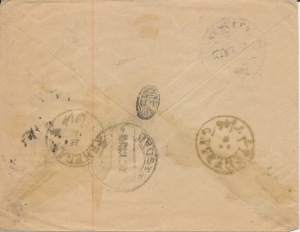One of the fascinations of Postal History or cover collecting is the story involved in just about every item and the history it portrays. I reached into a box of covers we bought recently and at random picked out the cover pictured above. Here’s the story as best I can reconstruct it: The cover was sent in 1910. It has a stamp of Turkey (Scott #136) and was sent from Kerbala to Teheran. Before WW I and the collapse of the Ottoman Empire most of the Middle East was under the political control in one way or another of Turkey. This is why Turkish stamps were being used in Iraq. The letter is sent from Kerbala, one of Iraq’s largest cities, which is also the city where Hussein ibn Ali (the grandson of the Prophet who was involved in a dynastic struggle after his death) was martyred in 680. Ali’s martyrdom was the central rift between Shi’a Islam and Sunni Islam- a rift that is greater than that between Catholicism and Protestantism (and we know how many centuries of war that dispute caused). Iran is the traditional home to the Shia’s and though Iraq has a large Shi’a population, it, like most of the rest of the mid East, is Sunni. The dates indicate that that the sender was on a religious mission to celebrate the anniversary of Ali’s death, a major holiday in Shi’a Islam.The writing on the letter is Farsi script (showing that the writer was Persian), not Arabic. All this is from just a casual perusal of a easily found cover worth $20 or so. A real researcher could spend hours on this and have a story on how relations between Iraq and Iran have evolved based on religious animosities between the Shi’as and the Sunnis. And from this the collector could understand a bit better so much of what has been in the news about Iraq over the last twenty years and what will surely be in the news over the next few years as the United States extricates itself from the religious quagmire that has existed there for over a thousand years. Had there been a postal history collector in the White House in 2003 we might not have been so sanguine about the prospects for Iraq after Saddam.



